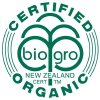The Certified Organic Seal
Used In Australia
There is not just one certified organic seal for products from Australia and New Zealand. In Australia products must meet government standards but rather than carrying a government supplied seal they will display the seal of the certifying organization. In New Zealand there is no government oversight of organic standards.
The Australian National Standard for Organic and Bio-Dynamic Produce was first implemented in 1992. It was originally known as the Australian Export Standard. It has provided the organic industry with a national standard which stipulates minimum requirements for products with labeling which states or implies they have been produced under organic or bio-dynamic systems.
Food Standards Australia New Zealand
Food Standards Australia New Zealand is a bi-nation agency which developed and administers the Australia New Zealand Food Standards Code. The code lists requirements for such things as food additives, food safety, labeling and GMO foods. Code interpretation and enforcement is the responsibility of state and territory food agencies within Australia.
The New Zealand process will be discussed in a bit.
Australian Organic

Australian Organic owns and supports the nation’s largest organic certifying group Australian Certified Organic.
The main objective of Australian Organic is to be the industries foremost representative body raising awareness of products wearing the Australian Certified Organic logo and supporting its members and clients.
They work tirelessly to establish a diverse and flourishing organic industry which is profitably and sustainably meeting the needs of a growing consumer base which is demanding Australian Certified Organic products.
Click on this link to learn more about the Australian Organic programs.
Australian Certified Organic Seal
The (ACO) Australian Certified Organic seal is used for many different consumer products. It covers not only all types of food and beverages but also body care products, skin care products, makeup, textiles virtually anything that can be put in or on your body and much more.
Follow this link to learn more about the
Australian Certified Organic programs.
The Certified Organic Seal
Used In New Zealand

While it is true that there is no government regulation of the organic certifications in New Zealand it does not mean that there isn't any oversight. Commercial producers of organic products in New Zealand are subject to the Fair Trade Act which covers false or misleading advertising. There are a couple of international organizations Demeter International and IFOAM which oversee the organic certification processes in New Zealand. The primary New Zealand certification agency is BioGro. BioGro was started in the early 1980's and is the leading organic certifier in the country.
Demeter International is the largest certifier of biodynamic agriculture and is one of the three largest organic certifiers. Demeter International was established in 1928 and currently operates in more than 50 countries.
IFOAM - Organic International is the worldwide umbrella organization for the certification of organic agriculture. They represent more than 800 affiliates in more than 115 countries. Their mission is to "Lead, unite and assist the organic movement in its full diversity."
BioGro is the primary New Zealand based certification agency which was formed in 1983. They are responsible for overseeing the certification of anything and everything that is produced in New Zealand and can be certified organic.
You can follow this link to learn more about BioGro